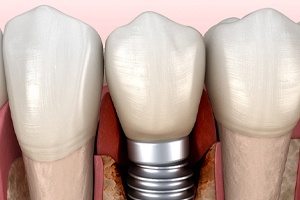
Dental Implant Failure & Salvage – Belmont, NH
Preserving Your Restored Smile

Dental implants are largely successful; they thrive in more than 95% of cases. Of course, it must be admitted that there is always a small chance of a failed dental implant in Belmont. If you ever believe that might be happening to you, call our practice right away. We will assess the situation and recommend a treatment. Hopefully, we will be able to preserve your implant and allow you to continue enjoying all the benefits of your prosthetic teeth.
Why Do Dental Implants Fail?

When dental implants in Belmont fail, it is usually due to an infection called peri-implantitis. It is a form of gum disease that occurs when bacteria attack the tissue around an implant. Eventually, the damage can become so severe that the gums and bone are no longer able to keep the implant in place. In most cases, poor oral hygiene is a contributor to peri-implantitis.
Other potential causes of dental implant failure include physical trauma, certain medical conditions (including some types of cancer), and failed osseointegration (the implant never bonds with the surrounding bone).
Symptoms of Failed Dental Implants

Because dental implant failure can occur at any time, you should always be on the lookout for its symptoms, even if it has been years or even decades since your original surgery. Here are some signs that you should see a dentist as soon as possible:
- Some pain is normal during recovery from dental implant surgery. However, severe and/or lingering pain may indicate a serious problem.
- Signs of infection. Pus, red gums, swollen gums, bleeding gums, and receding gums may all point to peri-implantitis.
- Difficulty eating. Once your new teeth are in place and you adapt to using them, it should be easy for you to eat virtually any food. Problems in this area merit professional care.
- A loose-feeling implant. In some cases, this issue is related to an implant’s restoration. At other times, the implant itself has a problem and is in danger of failing.
How Dental Implant Salvage Works

Call us right away if you suspect you are suffering from dental implant failure. The longer you wait for treatment, the less likely it is that we will be able to address the issue with conservative measures.
When you arrive for your appointment, we will examine your mouth and perhaps take some X-Rays. Depending on what we find, we might recommend that you take antibiotics, change your oral hygiene routine, or undergo other procedures. In some cases, we determine that it is necessary to remove a failed dental implant altogether. Later, after a healing period and other restorative procedures, you may be able to receive a new implant.